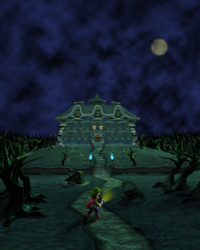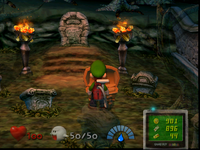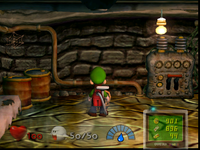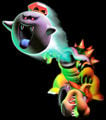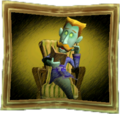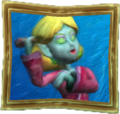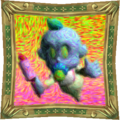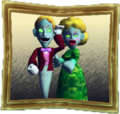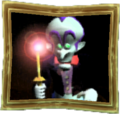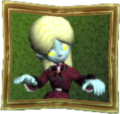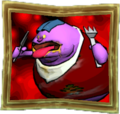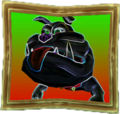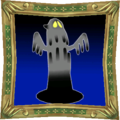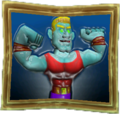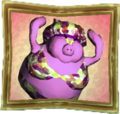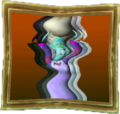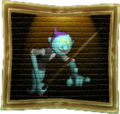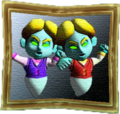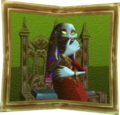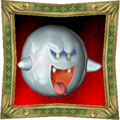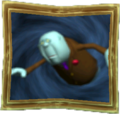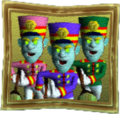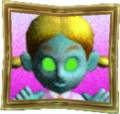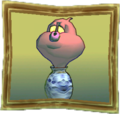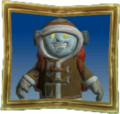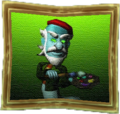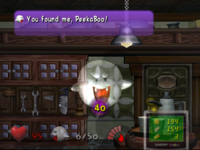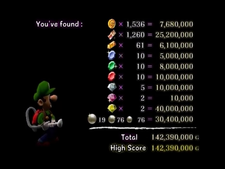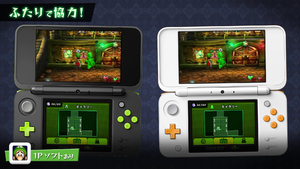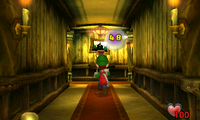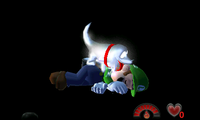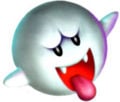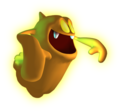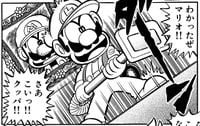Luigi's Mansion: Difference between revisions
TPIRFanSteve (talk | contribs) |
|||
| Line 316: | Line 316: | ||
*The glass around the Parlor doors has a different design. | *The glass around the Parlor doors has a different design. | ||
*The Parlor's doorknobs have a different design. | *The Parlor's doorknobs have a different design. | ||
* | *The Foyer, Training Room, Anteroom, Storage Room, Mirror Room, Graveyard's battle arena, Bathroom (2F), Balcony (3F), Breaker Room, and Clockwork Room have a different floor design. | ||
*Ghosts aren't as translucent. | *Ghosts aren't as translucent. | ||
*The Training Room is different, featuring flatter pipes with a pipe leading to a red value on the walls, a different wall design, two ceiling lights, and there two Pixelators in the Training Room. | *The Training Room is different, featuring flatter pipes with a pipe leading to a red value on the walls, a different wall design, two ceiling lights, and there two Pixelators in the Training Room. | ||
Revision as of 21:20, October 13, 2018
- This article is about the game Luigi's Mansion. For the mansion itself, see Luigi's Mansion (place). For other uses, see Luigi's Mansion (disambiguation).
Template:Infobox Luigi's Mansion is a launch title for the Nintendo GameCube initially released in 2001 and the first installment of the Luigi's Mansion series. It marks the second time where Luigi is the main character, with Mario playing a supporting role, the first being Mario is Missing!. A sequel to this game, titled Luigi's Mansion: Dark Moon, was released for Nintendo 3DS family systems in 2013. The game marks the debuts of King Boo, a major villain in the Mario franchise, and Professor E. Gadd, a major supporting character in the series.
The game was re-released for the Nintendo 3DS with additional features on October 12, 2018 in North America.[1] It will be released in Europe on October 19th, Australia on October 20th, and Japan and South Korea on November 8th.
Storyline
Instruction booklet
- And the grand prize is a big, haunted mansion!?
One day, Luigi received an unexpected message: You've won a huge mansion! Naturally, He [sic] got very excited and called his brother, Mario. "Mario? It's me, Luigi. I won myself a big mansion! Meet me there and we'll celebrate, what do you say?"
Luigi tried to follow the map to his new mansion, but the night was dark, and he became hopelessly lost in an eerie forest along the way. Finally, he came upon a gloomy mansion on the edge of the woods. According to the map, this mansion seemed to be the one Luigi was looking for. As soon as Luigi set foot in the mansion, he started to feel nervous. Mario, who should have arrived first, was nowhere to be seen. Not only that, but there were ghosts in the mansion!
Suddenly, a ghost lunged at Luigi! "Mario! Help meee!" That's when a strange old man with a vacuum cleaner on his back appeared out of nowhere! This strange fellow managed to rescue Luigi from the ghosts, then the two of them escaped...
It just so happened that the old man, Professor Elvin Gadd, who lived near the house, was researching his favorite subject, ghosts. Luigi told Professor E. Gadd that his brother Mario was missing, so the Professor decided to give Luigi two inventions that would help him search for his brother.
Luigi's not exactly known for his bravery. Can he get rid of all the prank-loving ghosts and find Mario?
Area 1
Luigi, having won a mansion in a contest he did not participate, enters Boo Woods and locates it. He enters the mansion and is soon attacked by a ghost, but Professor E. Gadd appears and attempts to vacuum the ghost with his Poltergust 3000. Though his attempt fails, he introduces himself to Luigi before quickly escorting him to his laboratory near the mansion when more ghosts appear. In the lab, E. Gadd tells Luigi that the house is an illusion that has appeared out of thin air, where Mario has been captured by King Boo and his minions. He gives Luigi the Poltergust 3000 to vacuum up ghosts and the Game Boy Horror to communicate with E. Gadd, scan objects, and see a map of the mansion.
Luigi enters the mansion, sucking up ghosts and finding keys, while meeting Toad along the way, until he encounters a portrait ghost, Neville. He defeats him, sucking him into the Poltergust 3000. He does the same to Lydia, Neville's wife, and fights their baby, Chauncey, who sucks Luigi into his crib and fights him as a giant ghost, but is defeated and sucked into the Poltergust 3000. With his ghost-hunting vacuum filling rapidly, Luigi returns to E. Gadd's lab and empties it, turning Neville, Lydia, and Chauncey back into portraits.
Area 2
Luigi enters Area 2, another area through a previously blocked door and fights more ghosts. After defeating the Floating Whirlindas, he enters the Storage Room and hits a switch, which opens a trapdoor where 50 Boos and their leader, King Boo, are hiding. All of them escape, flying into different rooms of the mansion. Luigi returns to E. Gadd's lab and E. Gadd tells him that the Boos were the ones who released the portrait ghosts - Luigi must capture the Boos to weaken their power, as they are stronger in greater numbers. So Luigi goes through the many rooms of the mansion, vacuuming up any Boos he sees. He also meets Madame Clairvoya, a fortune teller ghost, who tells him to bring her any of Mario's items he finds lying around in the mansion so she can get details on his whereabouts. The items are Mario's Hat, Mario's Glove, Mario's Shoe, Mario's Letter, and Mario's Star. After sucking up Shivers the butler, Melody Pianissima, Mr. Luggs, and Spooky the dog, Luigi enters the Cemetery and fights the shadowy ghost, Bogmire. He defeats him and sucks him into the Poltergust, which he then empties at E. Gadd's lab to turn all the Portrait Ghosts into portraits.
Area 3
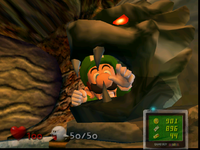
Luigi enters a third area into the courtyard. Down the well, he sees into King Boo's altar and discovers that King Boo has imprisoned Mario in a portrait. He goes through new rooms of the mansion, finding Mario's items and vacuuming up ghosts, including portrait ghosts Biff Atlas, Miss Petunia, Nana, Slim Bankshot, and twins Henry and Orville. After Luigi brings Madame Clairvoya enough of Mario's items, she tells him that she sees Bowser in a vision, which is shocking because Mario defeated Bowser and she suspects that King Boo revived him. With her job done, she tells Luigi to suck her into the Poltergust so she can return peacefully to her portrait. After he does so and defeats enough Boos, he enters the balcony and fights Boolossus, a big Boo made up of fifteen individual Boos. He throws him into a spiky statue to split him into his individual Boos and sucks them all into the Poltergust. He then empties the Poltergust at E. Gadd's lab to turn all the portrait ghosts, including Boolossus, into portraits.
Area 4
When Luigi enters Area 4 in the attic, the mansion is suddenly struck by lightning, creating a blackout throughout the mansion. He then goes to the breaker room to turn the power back on, but finds it locked. Luigi looks for the key and soon encounters a ghost named Uncle Grimmly and defeats him to get the key. After he turns the power back on, he catches more Boos and portrait ghosts, including the Clockwork Soldiers, Sue Pea, Jarvis, and Sir Weston, before entering the room of Vincent Van Gore, one of the most prominent portrait ghosts who is painting regular ghosts. He sends several waves of ghosts after Luigi, but Luigi defeats them all, causing Van Gore to go into a state of depression and Luigi sucks him into the Poltergust without much resistance. He then goes to the Secret Altar down a creepy hallway in the basement and encounters King Boo, who reveals that he was the one who told Luigi that he won the mansion in a contest and set it up as revenge for all the trouble they caused him. King Boo goes into Mario's portrait, which turns into a Bowser portrait and sucks Luigi into it. In an arena resembling the roof of the mansion with fire in the background, Luigi fights what appears to be Bowser (as Madame Clairvoya's vision had seen), but when he hits him in the head with a bomb, "Bowser" is revealed to be a protective suit worn by the true opponent: King Boo. Luigi defeats King Boo while avoiding the Bowser suit's head and sucks him into the Poltergust.
Luigi returns to the lab and turns all the portrait ghosts, including King Boo, into portraits again. E. Gadd then reverses the Portrificationizer to release Mario from his portrait. After Mario goes through a reverse-procedure of all the portrait-ghosts captured, he rockets out of the machine, colliding with Luigi, but otherwise alright. At first, Luigi is relieved that his brother is safe, but he bursts into laughter when he finds him stuck in one of the machine's frames.
Since King Boo has been defeated, his illusion of a mansion fades away, though the money and jewels Luigi collected in the mansion were real and with it he gets a new residence, which varies in size depending on the player's rank.
Gameplay
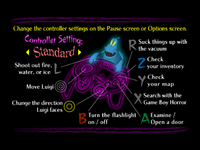
Luigi uses two devices given to him by E. Gadd to progress through the game: the Poltergust 3000 to suck up ghosts and the Game Boy Horror (which is designed to resemble a Game Boy Color) to investigate objects, navigate the mansion and communicate with E. Gadd. On top of its primary function, the Poltergust has various other uses as well, such as sucking up money and being used as a flashlight to help Luigi see and even stun ghosts. Once Luigi collects the corresponding Elemental Medal, he can also use the Poltergust to suck up Elemental Ghosts and expel their fire, water or ice powers to fight other ghosts and deplete their HPs so that Luigi can capture them. In turn, Luigi's own HP is lowered whenever he takes damage and requires him to replenish it by collecting Hearts, or risk a Game Over (at which point he collapses and the word "Goodnight" appears overhead).
Controls
Nintendo GameCube
- Move (in sidestep mode, the stick doesn't change Luigi's facing direction):

- Examine an object / Open a door / Call out for Mario / Reply to E. Gadd:

- Turn the flashlight on or off:

- Search, using the Game Boy Horror:

- Check the map:

- Check the inventory:

- Change direction Luigi faces:

- Shoot an element:

- Use the Poltergust:

Nintendo 3DS
- Move:
- Examine / Open a door / Call for Mario:
- Flashlight / Skip a cutscene:
- Search, using the Game Boy Horror:
- Change direction Luigi faces: Gyroscope / C Stick (New Nintendo 3DS only)
- Shoot an element / Blow:
(+
: Shoot elemental ball)
- Use the Poltergust:
- The touch screen is used to view the map, ghosts and collectibles, as well as to reply to E. Gadd.
Characters
- Professor Elvin Gadd.JPG
Ghosts
Common Ghosts
|
|
Portrait Ghosts
In his exploits, Luigi captures up to twenty-three gallery ghosts (five are optional). These ghosts (excluding the third and the final/fourth boss) have 100 HP, but their hearts are not automatically shown like other ghosts: Luigi must find each ghost's weakness before he can suck them up. The following are listed in order of appearance appear in the game:
Area One
Neville
The Bookish Father
(Required)Lydia
The Mirror-Gazing Mother
(Required)Chauncey
The Spoiled Baby
(Area Boss)
Area Two
The Floating Whirlindas
The Dancing Couple
(Required)Shivers
The Wandering Butler
(Required)Melody Pianissima
The Beautiful Pianist
(Required)Mr. Luggs
The Glutton
(Optional)Spooky
The Hungry Guard Dog
(Required)Bogmire
The Cemetery Shadow
(Area Boss)
Note: Although Luigi first meets Madame Clairvoya in Area Two, he captures her after he begins Area Three.
Area Three
Biff Atlas
The Bodybuilder
(Optional)Miss Petunia
The Bathing Beauty
(Required)Nana
The Scarf Knitting Granny
(Required)Slim Bankshot
The Lonely Poolshark
(Optional)Henry and Orville
The Twin Brothers
(Required)Madame Clairvoya
The Freaky Fortune Teller
(Required)Boolossus
The Jumbo Ghost
(Area Boss)
Area Four
Uncle Grimmly
Hermit of the Darkness
(Required)Clockwork Soldiers
The Toy Platoon
(Required)Sue Pea
The Dozing Girl
(Optional)Jarvis
The Jar Collector
(Optional)Sir Weston
The Chilly Climber
(Required)Vincent Van Gore
The Starving Artist
(Required)
The Boos
- Main article: List of Boos in Luigi's Mansion
There are 51 (including King Boo) Boos that hide in the various rooms of the mansion. 35 of these are named to differentiate between them, while the remaining 15 make up the third Boss of the game, Boolossus. The magic of the King Boo's spells increase based on the number of his minions nearby. Because of this, Luigi must capture 20 Boos to break the seal designed to block Boolossus from him. After capturing 20 more, the seal separating Luigi from King Boo was broken. If Luigi catches all 50 Boos, he will be rewarded with the extremely valuable Gold Diamond. Each of the Boos' names are puns. For example, "Booigi" is a pun on "Luigi" and "Game Boo" is a nod to the Game Boy.
Other Ghosts
Items
Money
| Image | Name | Score | Maximum Count | Image | Name | Score | Maximum Count | Image | Name | Score | Maximum Count | ||
|---|---|---|---|---|---|---|---|---|---|---|---|---|---|
| File:GoldCoin.png | Gold Coin | 5,000 G | 1536 | Bill | 20,000 G | 1260 | Gold Bar | 100,000 G | 61 | ||||
| File:BlueJewel.png | Blue Sapphires | 500,000 G | 10 | Green Emeralds | 800,000 G | 10 | Red Rubies | 1,000,000 G | 10 | ||||
| File:SilverDiamond.png | Silver Diamond | 2,000,000 G | 5 | File:RedDiamond.png | Red Diamond | 5,000 G | 2 | Gold Diamond | 20,000,000 G | 2 | |||
| Small Pearl | 50,000 G | 76 | Medium Pearl | 100,000 G | 76 | Big Pearl | 1,000,000 G | 19 |
Luigi's NEW Mansion
- Main article: Luigi's NEW Mansion
All of the money and treasure Luigi collects is used to build Luigi's NEW Mansion in place of the old one. The size and general quality of the mansion depends on exactly how much he collects, with the lower ranks featuring smaller mansions and the upper ranks featuring larger mansions. A painting of the mansion Luigi receives then appears at the front of the Gallery, with Luigi's total money on the bottom-left corner. The message reads "Welcome to Luigi's NEW Mansion!" unless Luigi achieves Rank A or H. The requirement to achieve Rank A was increased significantly during localization for PAL regions.
- Rank A: Finish the game at or above 100,000,000G or 150,000,000G(PAL). + Message: Congratulations! Your mansion is complete!
- Rank B: Finish the game with 70,000,000 to 99,999,999G or 70,000,000 to 149,999,999G(PAL).
- Rank C: Finish the game with 60,000,000 to 69,999,999G.
- Rank D: Finish the game with 50,000,000 to 59,999,999G.
- Rank E: Finish the game with 40,000,000 to 49,999,999G.
- Rank F: Finish the game with 20,000,000 to 39,999,999G.
- Rank G: Finish the game with 5,000,000 to 19,999,999G.
- Rank H: Finish the game with 5,000 to 4,999,999G. + Message: The haunted mansion disappeared without a trace...
The Rank A Mansion appears at the side of Luigi Circuit in Mario Kart: Double Dash!!. However, Rank D is shown in the opening of the sequel, Luigi's Mansion: Dark Moon.
Mario's items
Luigi may find several items that Mario has dropped in the mansion. Once he has received one, he can show it to Madame Clairvoya for information of Mario's whereabouts.
| Item | Location | Text |
|---|---|---|
Mario's Hat |
Laundry Room | You found Mario's Hat! And it's been laundered recently! |
| File:Mario's Letter.PNG Mario's Letter |
Courtyard | You found Mario's Letter! I wonder what it says... |
Mario's Shoe |
The Twins' Room | You found Mario's Shoe! It smells...like Mario's feet. |
Mario's Glove |
Projection Room | You found Mario's Glove! Eew... It's a little sweaty. |
| File:Mario's Star.PNG Mario's Star |
Observatory | You found Mario's Star! My, what a glittering beauty! |
Miscellaneous items
Professor E. Gadd's Gallery
Professor E. Gadd had trapped the Portrait Ghosts into paintings during his past ghost adventures and put them for display in his personal gallery - until King Boo released each of them. As Luigi recaptures gallery ghosts, they will be framed in three colors: bronze, silver, or gold. The color depends on how much HP (out of 100 for each non-boss gallery ghost) Luigi sucks in one go, which produce pearls:
- Bronze. Only small pearls, which Luigi earns one of for every 10 HP sucked in one go. The portraits show the ghosts in poor quality.
- Silver. At least one medium pearl, which the ghost gives up for every 50 HP sucked and every 10 after. So for 60, 70 and 80 HP in one go, Luigi earns another medium pearl. The portraits show the ghosts in better quality.
- Gold. The only big pearl possible is given up if Luigi can suck 90 HP in one go. The portraits of the ghosts are often just what they looked like when Luigi captured them.
If Luigi sucks all 100 HP at once, no extra pearl is awarded. The maximum amount of money to be gained per Portrait Ghost is 1,600,000G: 4 small pearls, 4 medium pearls and 1 big pearl.
Boss gallery ghosts' (Chauncey, Bogmire, Boolossus and King Boo) frames and quality are determined by how high Luigi's health is after capturing the ghost.
- Bronze. If Luigi fails to keep his health at 60 HP, he will get this painting.
- Silver. To get this portrait, Luigi's health must be kept above 60 HP at the end of the battle.
- Gold. To obtain this high-quality painting, his health must not have declined below 90 HP at the end of the battle.
The Nintendo 3DS version features a brand new Gallery.[2]
Hidden Mansion
Once the player beats the game for the first time, the quest can be restarted in the normal mansion or the "Hidden Mansion". The hidden mansion differs from the normal mansion in only two ways:
- Ghosts, including Boos, deal twice as much damage to Luigi.
- The Poltergust 3000 is 1.5× stronger. In addition to improving its reliability in regard to capturing ghosts, this helps improve Luigi's chance of earning larger Pearls, and thus acquire nicer frames for the Portrait Ghosts.
After American and Japanese players complained that the Hidden Mansion was virtually identical to the normal mansion, additional changes were made to the hidden mansion featured in the version of Luigi's Mansion released in Europe and Australia. Shigeru Miyamoto himself thought up some things to add to the PAL version's Hidden Mansion.[citation needed] Most of the changes made seem to make the PAL version harder than the NTSC version.
- The PAL Hidden Mansion is mirrored from left to right when compared to the Normal Mansion. The NTSC version keeps the layout the same.
- There are more normal ghosts around the mansion.
- Bosses are more difficult, such as having different attacks. Chauncey's rocking horses, for example, are much bigger and swerve left to right, instead of going straight. Another example is the Boolossus battle, in which the player rides around on the Poltergust 3000 while trying to pop Boolossus, which makes movement more slippery.
- Rooms are darker, albeit being as dark as in the NTSC version of both mansions. In comparison, the normal European mansion's rooms are lighter.
- Most Boos have more HP in the PAL version, although some have less.
- Fewer hearts are available. Locations that have hearts in the Normal Mansion do not have them. Hearts that heal 50 HP exist in the Courtyard by vacuuming the Slim Bankshot-like statue.
- Speedy Spirits and Gold Mice always drop a Silver Diamond when caught, raising the maximum possible amount of money from 142,390,000G to 186,440,000G.[3]
- The Hidden Mansion is necessary to play through in order to get an A rank as a result of the increased amount of money required.
- Instead of 40 Boos, 45 are required to fight the final boss.
- Boos are, in general, more agile and difficult to catch.
- Instead of three ghosts, five fight Luigi in The Artist's Studio.
Nintendo 3DS version
This section is about a port that has just been released on October 12, 2018. Major changes should be made by a contributor who has a reliable source.
This notice should be removed after a month has passed since the port was first released.
On March 8, 2018, Nintendo announced via a Nintendo Direct presentation that a port of Luigi's Mansion for the Nintendo 3DS would be released sometime in 2018,[4] which was released on October 12, 2018 in North America, and will be released on October 19th in Europe, October 20th in Australia, and November 8th in Japan and South Korea. The port is an enhanced remake of the original game with an additional map at the bottom of the handheld[5] and features a new Gallery for the Boss Rush mode to battle against already defeated boss ghosts either in single player or in multiplayer mode alongside a slime themed Luigi, dubbed Gooigi, brought from the future by E. Gadd.[6][7][8][9]
List of changes
- The box art updates Luigi's model, makes his torso more visible, his individual mustache hairs are defined and his clothes have simple detailing, his cap receives more shadows, hides more of the L on his cap, and gives the Boos the additional two teeth from their current appearance like in the sequel. The text is also shifted, causing the Gold Ghost and Boo in the background to be more visible.
- The game has amiibo compatibility for up to four amiibo figures consisting of Luigi, Mario, Toad and Boo, which can be used to revive health if it reaches zero and help spot Speedy Spirits, can help refill Luigi's HP while talking to Toad, a Super Mushroom will appear instead of a Poison Mushroom from enemies and such for health, and can be used to easily track down near by Boos respectively.[10][11]
- Whilst in The Lab, there are more options to choose from, now consisting of; The Mansion, The Hidden Mansion, The Gallery, Save, amiibo, and Play Co-op.
- The remake's overall walking style and design resembles that of the sequel rather than the original game.
- The lightning behind the Mansion is purple-colored and brighter.
- There are more trees in front of the Mansion's front yard and grounds outside of the gate.
- The broken-down horse carriage wagon outside the Mansion's gates is rotated and slightly different.
- The Mansion's gates have an arch design rather than being flat.
- Tombstones are positioned slightly different in front of the Mansion.
- The crows in the intro cutscene have visible feathers.
- The camera angle is more zoomed out.
- Rooms are slightly brighter.
- Due to the lack of Game Boy Horror functionalities at the start of the game, the "Your Mansion" map is displayed on the touch screen.
- Less dust is expelled while Luigi is walking.
- The player controls the direction Luigi is facing and the Game Boy Horror's first person screen by using the 3DS' gyroscope rather than
 .
. - There are now two control methods to catch ghosts: the flashlight, which is similar to the GameCube version, and the Strobulb, which is similar to Luigi's Mansion: Dark Moon.[12] The Circle Pad Pro accessory can be used to play the game as well.
- Luigi can go back to The Lab anytime by opening the mansion's front door within the Foyer.
- If Luigi attempts to open up a locked door, there's an animation of Luigi showing confusion.
- The glass around the Parlor doors has a different design.
- The Parlor's doorknobs have a different design.
- The Foyer, Training Room, Anteroom, Storage Room, Mirror Room, Graveyard's battle arena, Bathroom (2F), Balcony (3F), Breaker Room, and Clockwork Room have a different floor design.
- Ghosts aren't as translucent.
- The Training Room is different, featuring flatter pipes with a pipe leading to a red value on the walls, a different wall design, two ceiling lights, and there two Pixelators in the Training Room.
- Totaka's Song can now only be heard on the screen where the player chooses a control method for the first time.
- Gold Ghosts pop out of the Training Room's pipes as orbs instead of full fledged ghosts, similar to the Gold Ghost carrying the Parlor door key in the Foyer.
- The brand new Gallery area can be used to battle already beaten portrait ghosts for the Boss Rush mode either in single player or in multiplayer alongside Gooigi, whom has 50 HP.
- The E. Gadd's "Famous Ghost Collection" (not including Boolossus and King Boo) was composed of twenty five paintings,[13] four more than in the original version.[14]
- The Gallery will now let Luigi view all the portraits of the portrait ghosts depending on either the size of pearls dropped or health lost in battle.
- There are now achievements, which can be viewed from the Gallery and a statue of a normal ghost is rewarded and more statues can be earned to add on to the existing statue after each tier.[15]
- The search tool on the Game Boy Horror needs to be obtained by Luigi in the Gallery.
- Room names are displayed on the top screen upon entering a room, despite already being said on the lower touch screen, along with currency and ghosts captured.
- Loose coins from physical damage and collecting large amounts of money and gems last a few seconds longer before disappearing.
- There are cutscenes for when vines appear or disappear on doors, along with cutscenes for Spooky's doghouse in the Boneyard, and Bogmire's tombstone in the Graveyard.
- Gold Bones return to provide Luigi with extra lives.
- Once Chauncey is defeated, victory music is played afterwards upon returning to the Nursery.
- The Area doors lack vines and their emblems will illuminate and go faint repeatedly once their respectives keys has been achieved.
- There is a different painting in the first-floor Washroom.
- The Boo icon that shows how many Boos are captured is from Super Mario Maker instead of an original sprite.
- A unused voice clip from within the original game's files, "Nice Doggy!" makes its way on the remake while Luigi is in the Boneyard talking to Spooky.[16]
- The Conservatory has a slightly different painting, with the early unused blue ghosts holding their respective instruments slightly higher.
- The lights in the Balcony (3F) are purple-colored during the Boolossus fight.
- The Secret Altar has lion heads with a different design.
- The Mario painting in the Secret Altar is an oil painting style, much like his painting in Luigi's Mansion: Dark Moon, rather than the blurred style in the original game.
- Mario's dialog box is colored red instead of purple, with his head displayed beside the text.[17]
- The Hidden Mansion has received several changes:
- The ability to drain ghosts' HP much faster is removed.
- All ghosts, including Portrait Ghosts and Boos, have more HP (their base HP have been multiplied by 1.5, which allows Luigi to obtain more pearls from Portrait Ghosts).
- Powerful ghosts appear more often in dark rooms.
- Hearts now appear less often or are replaced by Poison Mushrooms.
- Speedy Spirit locations have been changed.
- Ghost mice and fish (pink and green) will appear in some dark rooms, making catching ghosts more difficult.
- Mario's item locations have been changed, except his star which is in the same location in the Observatory.
- S rank is a new rank, making it the highest rank in the remake instead of the A rank as in the original game.
Gallery
- For this subject's image gallery, see Gallery:Luigi's Mansion.
A Boo
- Professor Elvin Gadd.JPG
Professor E. Gadd with the Poltergust 3000.
Some of the different kinds of Ghosts (with Biff Atlas in the center) found in the game
Media
Quotes
- Main article: List of Luigi's Mansion quotes
Luigi
- "Hello?"
- "MARIO!/MARIOOO?/Mario?/M-M-M-M-Mario?"
- "Way to go, genius. Got the hang of that thing yet?"
- "What a dreadful picture... But that candle next to it might be important..."
- "I'm willing to bet there's something cold in here."
- "I always preferred the bottom bunk..."
- "Well, at least we won't have a shortage of toilet paper..."
- "Now that's just not my style."
- "You know... I never noticed how cute those red polka dots look on top!"
- "It's a picture...but I wouldn't call it art."
- "You know, I never noticed how lovely those red polka dots look on top!"
- "This looks quite old... I wonder how much it would sell for."
- "Looks ordinary... A little TOO ordinary."
- "I wonder why only this one's frozen..."
- "I bet I'd look pretty tough wearing one of these..."
- "One really shouldn't open this kind of thing without asking..."
- "Nothing unusual here... Boring!"
- "I don't think I can reach that directly..."
- "Boy, those Boos sure did make a realistic fake mansion..."
- "Now that I look at it-- it's full of moth holes! Yecch!"
- "So much dust! This will never pass the white-glove test!"
- "Well, they sure did pile odds and ends everywhere... Filthy."
- "I should probably give that a quick vacuuming..."
- "Oh, what's this?! Just how I like it... Nice and clean!"
- "Well, I sure can't read that from here..."
- "I wonder how old this is..."
- "Do Boos wash their faces?"
- "I've been wanting one of these for quite a while..."
- "Oh, wow... I've always wanted one of these!"
- "What kind of picture is this?"
- "I really have no use for this..."
- "Not particularly interesting..."
- "Hmmm... Weird..."
- "Awww, poor thing..."
- "How could anyone treat an animal that way? I won't stand for it!!"
- "Oh, what's this?! This would sure fetch a pretty penny..."
- "Looks like something might be in there..."
- "Now, that's a classic. I wonder how much it would sell for."
- "If you look closely, you can tell it's really just a photograph!"
- "This looks like it might break if I sit on it..."
- "Man, I'm tired... That bed sure looks comfy."
- "I could just curl up there and sleep until dawn..."
- "Now who is this supposed to be?"
- "Was someone trying to show off or what?"
- "What's this?! Looks fancy!"
- "WAHAHA! Who designed this?!"
- "There's something fishy here..."
- "I really should work out more. Maybe I ought to throw a few quick jabs while I'm here..."
- "I'm not so interested in bikes..."
- "I've always been a good runner..."
- "I don't care much for pointy objects..."
- "It looks old, but I bet it still has a nice tone..."
- "Hmm. Should I play it?"
- "I never could play the piano..."
- "Looks like a fun place to make shadow puppets..."
- "Looks like this hasn't gotten much use of late..."
- "What's this, an antique?"
- "Wouldn't it be nice if I could raise carrier pigeons here?"
- "What in the world is this?"
- "This is the kind of thing I would put in the bathroom..."
- "Fabulous!"
- "Exquisite..."
Mario
- "Get me outta here!"
- "Ey, Luigi, What's the hold-up?"
Professor E. Gadd
- "I'm getting too old for this ghost-catching tomfoolery."
- "I swear, this house seems to have more and more ghosts every day!"
- "Alright, youngster! Look lively! Follow me, posthaste!"
King Boo
- "I don't plan to give up my favorite decoration. I like Mario where he is."
Development
The idea for Luigi's Mansion was first centered around exploration many different rooms, similar to The Legend of Zelda's dungeons. Mario was initially chosen as the protagonist. The team wanted the location to be a huge house from the start, and it began as a "Japanese-style Ninja house." After some playtests, the setting was retooled to resemble a dollhouse, as the player would always be looking through one of the walls to see the rest of the room. As the lighting scheme was developed, the team focused on darkness and shadows, which turned the dollhouse into an "American-style haunted mansion." With the change in setting and the new emphasis on ghosts, Luigi was chosen to be the new protagonist, as the team wanted a cowardly character and Mario was more known for being brave. The Portrait Ghosts were created in order to distinguish them from the rest of the Mario series' ghosts, namely Boos. The team also considered using no characters at all from the rest of the Mario series besides Luigi and Mario to establish the game as not just "another chapter in the Mario series," though they eventually resolved to use the series' characters sparingly.[18]
As development for Luigi's Mansion took place alongside the Nintendo GameCube's development, the team was able to make recommendations for increasing the console's capabilities. Among those requests was dynamic lighting, something that team chiefly wanted, which was eventually added to the graphics chip. Working with the Nintendo GameCube instead of the Nintendo 64 saved a lot of time that might have otherwise been spent overcoming the latter console's technical hurdles. The game had also started development before the Nintendo GameCube's console was designed, though the team wanted to use two analog sticks from the start and base the controls largely around the sticks, generally simplifying the controls. Once the controller was finalized and put into use, many of the game's testers commented on how the C Stick was uncomfortable to use for a long time, causing a redesign that made it wider and more comfortable for thumbs.[18]
The game's elements, fire, water and ice, came as a result of the team wanting to "display fire water, and atmospheric effects realistically." Early on, dust clouds used a fixed animation every time the dust was interacted with and the team wanted to make it more interesting through dynamic interactions. One programmer worked on the dust for six months. Another effect that the team handled was the "stretch" effects produced by the ghosts when being vacuumed and a lot of work was spent making sure it functioned properly. Motion capture was used in the game's intro (notably while Luigi is walking in a "very cowardly way") and ending.[18]
A lot of time was spent discussing how difficult the team wanted the game to be. This led to work on a control scheme that only used a single analog stick, which was eventually scrapped, though it led to the "Standard" control scheme being added with the "Sidestep" control scheme. This also led to keys automatically showing which door they opened on the map and the team felt that players would be frustrated otherwise. Eventually, the team concluded that they wanted the difficulty to be well-balanced, which was important for a launch title. In a similar vein to Yoshi's Story, they wanted the game to only need a few hours to beat, but also make the player feel motivated to replay it again. This philosophy led to an emphasis on puzzle elements and not item collection and the ability to ignore certain elements of the game.[18]
The game's schedule was tight; there were several arguments between the designers and the programmers over which features might not be implemented, but by the end of development, more ideas were being added and not many features were removed. The ability to turn off the flashlight was among those late features, after a suggestion by Shigeru Miyamoto to let the players do more with the other buttons. Miyamoto also suggested that Luigi immediately tap the wall when pressing ![]() instead of going through a long animation. Luigi's whistling and humming, as well as his ability to call for Mario, were all added late into the game's cycle as well. The humming came about after the team decided that background music would be uninteresting and Luigi's call came about after a staff member suggested it to reinforce Luigi's goal of finding Mario. The team intended for their end result to not be scary for the players; the team wanted to create something innovative that functioned well just from a technical standpoint. They spent time creating a unique style to the game and not worrying about how it matched up to other games, as their game is "different, unique."[18]
instead of going through a long animation. Luigi's whistling and humming, as well as his ability to call for Mario, were all added late into the game's cycle as well. The humming came about after the team decided that background music would be uninteresting and Luigi's call came about after a staff member suggested it to reinforce Luigi's goal of finding Mario. The team intended for their end result to not be scary for the players; the team wanted to create something innovative that functioned well just from a technical standpoint. They spent time creating a unique style to the game and not worrying about how it matched up to other games, as their game is "different, unique."[18]
Pre-release and unused content
- Main article: List of Luigi's Mansion pre-release and unused content
Luigi's Mansion was originally planned to be a Nintendo 64 game. Many rooms had different names in one or more early builds; for example, the Foyer was originally called the "Entrance". The Poltergust 3000 used to have a pressure meter and, if it overheated, the Poltergust 3000 would ignite and injure Luigi. The Poltergust's shape is also more rectangular in one or more early versions. It was also possibly a much darker game in development, as shown by an unused Game Over clip.
Staff
- Main article: List of Luigi's Mansion staff
- Main article: List of Luigi's Mansion (Nintendo 3DS) staff
The original game's producers were Shigeru Miyamoto and Takashi Tezuka, and the director of the game was Hideki Konno. The music was composed by Kazumi Totaka and Shinobu Tanaka.
Other media
Luigi's Mansion appears in volume 26 and 29 of Super Mario-Kun. In volume 26, which usually follows the story of Paper Mario, the Luigi's Mansion section is condensed into one chapter. The story begins similarly to the game: Luigi wins a mansion. He tries calling Mario's name, but Mario is absent. Luigi then treks to the mansion by himself. After a walk through the forest at night, Luigi is horrified to see his mansion. There, he meets a harmless Boo (案内役 テレサ) that leads him into the mansion. Inside the mansion, he and the Boo find a vacuum, so he tests it on the Boo, much to the Boo's anger. Luigi proceeds to vacuum the ghosts and he even encounters a Ghost Guy, which he doodles on its face.
Luigi then finds Mario trapped in a painting. Luigi is then ambushed by Bowser. Luigi attempts to run behind Bowser, but Bowser twists his head and burns Luigi. While Bowser throws a spike ball, Luigi uses his vacuum to deflect it at him, knocking off the head. King Boo flies out and Luigi proceeds to suck in King Boo, breaking the spell and freeing Mario. The Bowser head, still flying, lands on Luigi's head and Mario, mistaking him for Bowser, fights him. Once Mario realizes his mistake, he immediately regrets what he's done and the Boo watches them. Despite the chapters being seemingly disjointed, Luigi later joins Mario during a fight with Huff N. Puff and uses a new Poltergust to vacuum the Tuff Puffs.
Not much is known in the segment in volume 29, but Toad travels along with Luigi.
References to other games
- Mario Bros. and Super Mario World: Both games were mentioned during Melody's quiz.
- Super Mario Bros.: One of the songs that Melody plays on her piano is a rearrangement of the underwater stage theme. Also, the Luigi sprite shown on the Game Boy Horror is a sprite from the Super Mario All-Stars version of the game. The game's aboveground stage theme is played if Luigi checks all instruments in the Conservatory and the underground theme is played during a part of the credits. The mysterious "Bowser" manned by King Boo may also be loosely based on the Bowser Impostors from this game in castles 1 through 7.
- Super Mario Bros. 3: One of the other songs played on Melody's piano is a rearrangement of the grass stage theme.
- Wario Land: Super Mario Land 3: Luigi's new mansion at the end of the game depends on the score the player has, similar to how Wario's abode will end up better with a higher score.
- Super Mario 64: When Luigi is talking to Toad, an arrangement of the theme heard when talking to Toads in Super Mario 64 is played. Several other sound effects were taken from this game as well. Also, Madame Clairvoya says that Bowser had recently been defeated by Mario.
- Mario Golf: Template:Media link for this game is a sepia recoloring of Mario Golf's Template:Media link.
- Paper Mario: Although this reference was lost during translation, one of Neville's books (in the Japanese version) is titled "Mario Story" which is both Paper Mario's Japanese title and the title of the book Herringway wrote about the game's story (also in the Japanese version).
- Luigi's Mansion: Dark Moon: When Gooigi is introduced in the Nintendo 3DS version, the Professor E. Gadd from the future that sent him is the one from during the events of this game. The ring tone that plays during future E. Gadd's call is that of the Dual Scream, and Gloomy Manor can be seen on the monitor behind him.
References in later games
- Super Smash Bros. Melee: A Luigi's Mansion trophy appears in this game, which depicts Luigi using the Poltergust 3000.
- Super Mario Sunshine: One of the game's bosses is named King Boo in the English version, though the character is otherwise unrelated to the antagonist from Luigi's Mansion. Professor E. Gadd is said to have invented F.L.U.D.D. and Bowser Jr.'s magic brush and is mentioned by Bowser Jr. as "a strange old man in a white coat". A Pianta cleaning the ducts of Hotel Delfino in the episode 'Mysterious Hotel Delfino' at Sirena Beach wishes that someone would suck up the ghosts in the hotel with a vacuum, as a reference to the Poltergust 3000.
- Mario Party 4: The Gaddlight is an item in the game used to repel Boos and keep them from stealing coins or stars.
- Mario Kart: Double Dash!!: Luigi's Mansion appears as an unlockable battle stage in this game. King Boo appears as an unlockable playable character. Several of the Portrait Ghosts appear in the main area, including King Boo's gold frame. Luigi's Rank A Mansion appears in the background of Luigi Circuit.
- Wario World: The ending conditions to restoring Wario's Castle are similar to those of the endings in this game.
- Mario & Luigi: Superstar Saga: Professor E. Gadd makes a cameo appearance and Luigi occasionally takes out the Poltergust 3000. A few of the ghosts appear in the Starbeans Café and are vacuumed by E. Gadd, while the Luigi's Mansion theme plays.
- Paper Mario: The Thousand-Year Door: When Luigi appears in the audience, he occasionally has the Poltergust 3000 on his back. It does not affect anything in-game, though.
- Mario Power Tennis: Luigi's Mansion is also a playable tennis court that has the ghosts rising from their graves trying to distract the players. Luigi uses the Poltergust 3000 for his defense shot.
- Super Mario 64 DS: King Boo appeared as a boss in this game, capturing Luigi after vowing to catch him in Luigi's Mansion. After he was defeated by Mario, Luigi can be unlocked. There is a minigame in the Rec Room based on Luigi's Mansion called Hide and Boo Seek, where Luigi has to find a certain amount of Boos in the darkness by scribbling out the black to reveal them. Some of Luigi's voice clips were reused in this game.
- Super Princess Peach: King Boo appears as a boss and is destroyed after being defeated by Peach.
- Mario Kart DS: Luigi's Mansion appears as a race course in this game. The Poltergust 4000 (based on the Poltergust 3000) was Luigi's first character-specific kart.
- Mario & Luigi: Partners in Time: Professor E. Gadd appears again and has a more major role than in the previous Mario & Luigi game. When the Mario Bros. travel into the past, they meet the younger E. Gadd whose lab is destroyed by a volcanic eruption and he says he will set up a new lab in Boo Woods, foreshadowing Luigi's Mansion. In most scenes with Professor E. Gadd, an arrangement of the Luigi's Mansion theme can be heard.
- Mario Hoops 3-on-3: Luigi's Mansion appears as a basketball court, where the ghosts from Luigi's Mansion fly around trying to grab the basketball.
- Super Paper Mario: The main foyer of the mansion appears to be the location of the Mansion Patrol arcade game.
- Mario Party 8: The ghosts from Luigi's Mansion re-appear in the minigame (which may be somewhat based on Luigi's Mansion) Specter Inspector.
- Super Mario Galaxy: Luigi appears in the Ghostly Galaxy after being kidnapped by the ghost Bouldergeist and Mario must save his brother. This is the exact opposite of what happens in Luigi's Mansion.
- Super Smash Bros. Brawl: Luigi's Mansion appears as an unlockable stage and trophy in this game. The Luigi's Mansion main theme is one of the selectable music themes for this stage. In the "King Dedede steals Peach" and "King Dedede steals Zelda" cutscenes of the Subspace Emissary (where Luigi is introduced), a different arrangement of the Luigi's Mansion theme plays.[19]
- Mario Kart Wii: King Boo reappears as an unlockable playable character.
- Mario Super Sluggers: Luigi's Mansion is a playable baseball park.
- Mario Sports Mix: Luigi's Mansion makes an appearance as a basketball court and a volleyball court.
- Mario Kart 7: Luigi's Mansion from Mario Kart DS returns as a retro stage.
- Mario Party 9: King Boo reappears as a boss in the minigame King Boo's Puzzle Attack. In Boo's Horror Castle, there are painting references of Garbage Can Ghosts and Vincent Van Gore. Some of the rooms of the mansion are also referenced.
- Mario & Luigi: Dream Team: One of the messages floating in Luigi's Dream's Deep says "I fight ghosts!", a reference to this game.
- Super Smash Bros. for Wii U: Luigi's Mansion remains unchanged as the stage from Super Smash Bros. Brawl.
- Mario Kart 8: Luigi's Mansion can be seen in the background of Baby Park.
- Mario Kart 8 Deluxe: Luigi's Mansion from Mario Kart: Double Dash!! returns as a retro battle course.
- Mario + Rabbids Kingdom Battle: Luigi's weapons are modeled after vacuum cleaners, in reference to the Poltergust 3000. Additionally, several of Luigi's voice clips from this game are reused.
- Super Smash Bros. Ultimate: Luigi's Mansion once again returns as a stage, with the layout unchanged. Simon and Richter Belmont's debut trailer has Luigi traversing Dracula's Castle with his Poltergust and being extremely terrified of his surroundings before being killed by Death, a clear allusion to Luigi's role in the game and to a lesser extent its sequel.
Reception
It has been requested that this article be rewritten and expanded to include more information. Reason: meet the reception policy guidelines
The game has received mostly positive reviews. Gamespot gave the game a 7.9/10, saying that it featured creative and refreshing ideas, but it strays too far from the Mario series.[20] IGN also gave it a positive review, giving it a 7/10, praising its graphics, sounds, and gameplay but heavily panning the lack of any replay value.[21] Nintendo Life gave it an 8/10, claiming it's a well-crafted game, but criticized how short the length of the game was.[22] The game was mainly praised for its clever features and for giving Luigi a starring role. However, it was criticized for its short length.
Luigi's Mansion is the 5th best selling game for the Nintendo GameCube, having sold approximately 3.6 million copies, including 2.19 million in the US, 460,000 copies in Japan and 100,000 units in the UK, as of December 31, 2009.[citation needed]
Luigi's Mansion won the BAFTA Interactive Entertainment Award for audio in 2002.[23]
Names in other languages
| Language | Name | Meaning | Notes |
|---|
Trivia
- The box art resembles the cover photo of the 1990 film Home Alone.
- A mistake on page 30 of the U.S. edition of the Luigi's Mansion instruction booklet shows Professor E. Gadd speaking in Japanese.
- Totaka's theme can be heard by going to the Training Room and waiting at the tutorial screen (the one where Luigi learns how to use the Poltergust 3000) for 3 minutes and 15 seconds.
- This was the last entry in the Mario franchise to see former Nintendo president Hiroshi Yamauchi as its executive producer before his retirement, 12 years before his death in 2013; Yamauchi had been executive producer for the series since its inception.
References
- ^ Cite error: Invalid
<ref>tag; no text was provided for refs namedUSADate - ^ https://www.youtube.com/watch?v=NsFna-Z1MjU&t=344s
- ^ Luigi’s Mansion – PAL: mansion value
- ^ https://www.youtube.com/watch?v=NsFna-Z1MjU&t=291s
- ^ https://www.youtube.com/watch?v=NsFna-Z1MjU&t=339s
- ^ https://www.youtube.com/watch?v=WyEIhB6gw20&t=28
- ^ https://www.youtube.com/watch?v=NsFna-Z1MjU&t=344s
- ^ https://www.youtube.com/watch?v=NsFna-Z1MjU&t=345s
- ^ https://www.nintendo.com/whatsnew/detail/dont-be-scared-by-the-launch-of-luigis-mansion-for-nintendo-3ds-on-oct-12-2018
- ^ https://nintendowire.com/news/2018/06/12/luigis-mansion-remake-has-amiibo-support/
- ^ https://www.ign.com/articles/2018/09/13/luigis-mansion-3-coming-to-switch-in-2019
- ^ Luigi's Mansion gameplay section
- ^ GameXplain. (October 5, 2018). Luigi's Mansion 3DS - Tour of the NEW Gallery, Achievements, and...a Game Boy Horror Cartridge?!
- ^ https://youtu.be/SUAwsMK17Vg?t=436
- ^ GameXplain. (September 18, 2018). 15 Minutes of Luigi's Mansion 3DS - Featuring Co-Op Mode (Direct Audio). YouTube. Retrieved September 23, 2018.
- ^ https://www.youtube.com/watch?v=KSIp5Jckg0M&t=73
- ^ Kai. (September 14, 2018). Nintendo Switchで『ルイージマンション3 (仮称)』が2019年に発売決定! / ニンテンドー3DS『ルイージマンション』は2018年11月8日に発売。 Nintendo. Retrieved September 24, 2018.
- ^ a b c d e Sinfield, George. Luigi's Mansion Official Nintendo Player's Guide, pages 88-93. "Developer Interview" with team members Hideki Konno, Tadashi Sugiyama, and Hiroki Sotoike.
- ^ [1]
- ^ [2]
- ^ [3]
- ^ [4]
- ^ Interactive in 2002. BAFTA. Retrieved July 11, 2018.
External links
- Japanese website
- European (UK) microsite
- North American website (Internet Archive: Wayback Machine)
- North American website (Nintendo 3DS version)
- North American website (game details) (Nintendo 3DS version)
